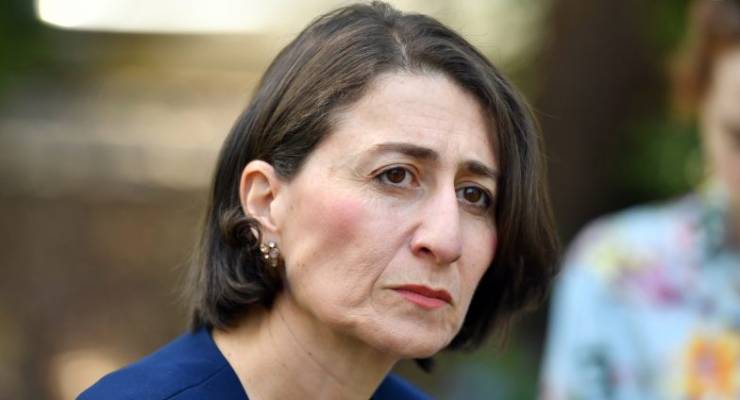
Reminiscent of the speed with which Malcolm Turnbull rejected the Uluru Statement from the Heart, New South Wales Premier Gladys Berejiklian has confirmed that she will blindly refuse to accept sensible advice from the NSW coroner on decriminalisng drugs. This is despite the fact that she hasn’t formally received the recommendations to be made by the coroner following an inquest into several drug overdose deaths at music festivals.
The recommendations from Coroner Harriet Grahame, leaked to The Daily Telegraph, will include that pill-testing be introduced, and sniffer dogs and strip searches abolished, as practical evidence-based measures to materially reduce the risk of overdoses and deaths.
Berejiklian has been all over the media in response, reiterating her favoured mantra: there is no safe way to take illegal drugs. Her government is reintroducing legislation, previously knocked back by the NSW upper house, imposing stringent new obligations on festival organisers to further ramp up the standing policy of prevention.
On one side are the parents of previous overdose victims; almost the entire medical profession; researchers who have dug deep on this issue; even a previous Federal Police commissioner. Their message: prohibition does not work. Kids will take pills. Surely the top priority must be to reduce the risk that those pills will kill them.
On the other side are conservative politicians and loud media voices, repeating their talking point: drugs are illegal. As Berejiklian says every time, what we need to be doing is convincing kids not to take them in the first place.
Ignoring the question of why some drugs are illegal and others not, which is a moral issue dressed up as a public safety one, my interest is in the peculiar policy logic of prohibition. Why do lawmakers mulishly pursue policies that are known, beyond any doubt whatsoever, to be futile?
The guide book on prohibition was written by, well, Prohibition. The United States enacted the 18th amendment to its constitution in 1919, making it illegal to produce, transport or sell alcohol throughout the country. Its policy basis was strictly moral: the temperance movement had identified liquor as the root cause of marital and family breakdown and it was widely seen as an evil influence on society.
Famously, by the time Prohibition was repealed in 1933, it had not just failed to stop people from desiring a drink (and getting one); it had fuelled the rise of organised crime. Al Capone reputedly turned over $60 million a year in the 1920s from illicit liquor enterprises.
As a mass experiment in policy implementation, you couldn’t do any better. Yet the results didn’t give the US even a moment’s pause in its later decision to start a “war on drugs” under Ronald Reagan, which is still going 40 years later and has, like Prohibition, consistently failed.
In Australia, it has been routinely treated as political poison for a major party to align itself with any attitude to drugs other than maintaining their illegality and advocating ever more inventive ways to prevent them. The concept of medicinal cannabis is gaining a creeping acceptance due to its loophole status as a substance with an apparently beneficial use; thus its allowance doesn’t offend the moral core of the abolition camp.
But pills? No way, no how. Now — we know that kids take them in huge quantities, particularly at festivals. We know also that telling people that drugs are bad has never worked, either as an advertising approach or by virtue of enforcement.
We also know, because of expert evidence here, and years of actual experience overseas, that the measures of prevention/terror currently implemented by NSW Police don’t work and, in fact, are more likely to increase risky behaviour than suppress it. And, beyond doubt, we know that pill-testing reduces deaths and injury. Vastly. It protects very young people who have not done anything worse than try to get a high at a dance party.
So, why do Berejiklian and co stick to their guns? Why does the NSW police commissioner keep saying that he can’t condone a policy that would enable illegal behaviour, when he knows better than anyone that it would materially enhance public safety, the primary purpose of his command?
Much law-making is ideological, of course. Moral beliefs, whether religious or not, are a fragile foundation for policy, but they can arguably compete for that role with other theories of social organisation. The outlawing of murder can be justified equally because it’s a commandment, or because it breaches the social contract. Same-same, in practical terms.
But the bible doesn’t mention MDMA. The morality-based arguments for drug prohibition are hard to pin down, which is why they tend to get muddled up with more pragmatic justifications like social harm or protection of people from their own risk-taking impulses (unlike gambling, which is completely fine).
The result is that the insistence of politicians that the war on drugs must be maintained, that prohibition is the answer, can’t even really be called ideological; at least, not in any coherent way. And if not that, then what is it?
It’s just dumb, that’s what it is. Blind, bull-headed, unthinking ignorance. And that is no basis for lawmaking at all.








Crikey is committed to hosting lively discussions. Help us keep the conversation useful, interesting and welcoming. We aim to publish comments quickly in the interest of promoting robust conversation, but we’re a small team and we deploy filters to protect against legal risk. Occasionally your comment may be held up while we review, but we’re working as fast as we can to keep the conversation rolling.
The Crikey comment section is members-only content. Please subscribe to leave a comment.
The Crikey comment section is members-only content. Please login to leave a comment.